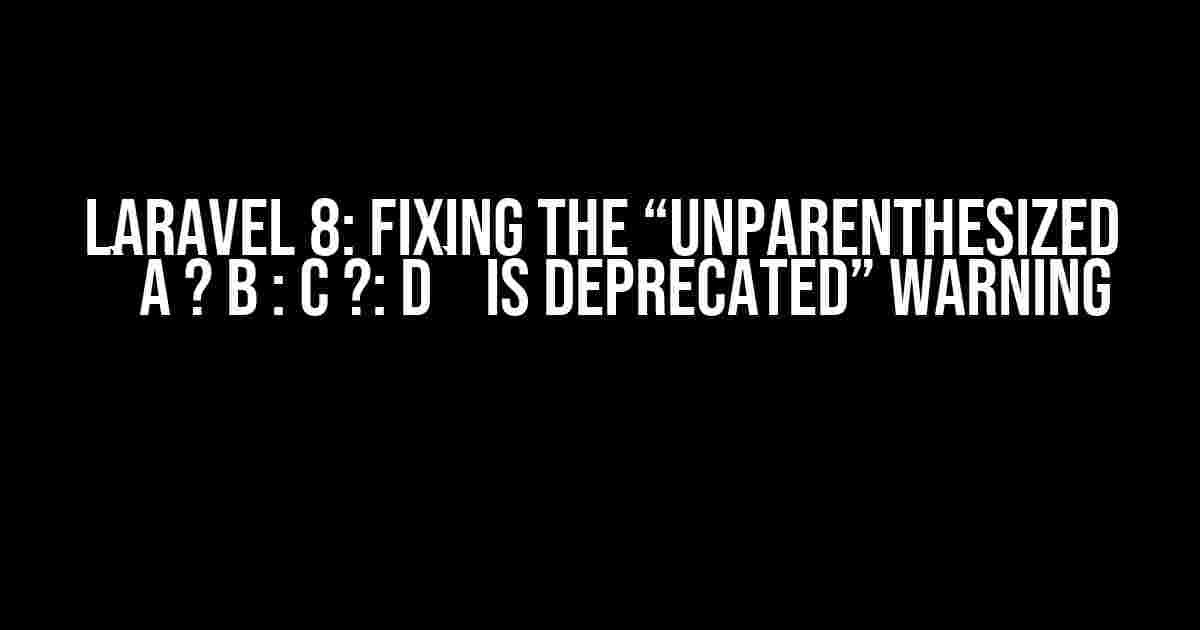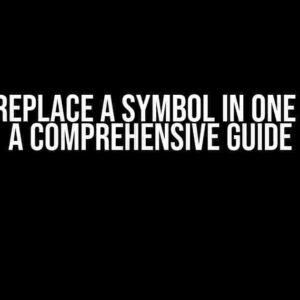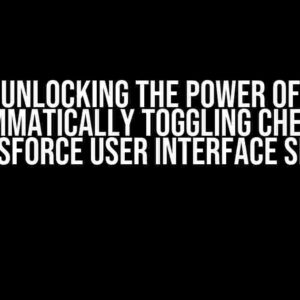If you’ve recently upgraded to Laravel 8, you might have encountered a warning that’s got you stumped: “Unparenthesized `a ? b : c ?: d` is deprecated.” Don’t worry, we’ve got you covered! In this article, we’ll dive into what this warning means, why it’s happening, and most importantly, how to fix it.
What’s the warning about?
The warning “Unparenthesized `a ? b : c ?: d` is deprecated” is related to the Elvis operator (`?:`) in PHP. The Elvis operator is a shorthand for the ternary operator, which allows you to simplify conditional statements. However, in PHP 7.3 and later, the Elvis operator has been deprecated when used without parentheses.
So, what does this mean? Well, consider the following example:
a ? b : c ?: dIn this example, the Elvis operator (`?:`) is used without parentheses. This is what’s causing the warning. To fix it, you need to add parentheses to clarify the order of operations.
Why is this warning appearing in Laravel 8?
Laravel 8 is built on top of PHP 7.3 and later, which means it inherits the deprecation of the unparenthesized Elvis operator. When you upgrade to Laravel 8, you might see this warning appear in your application, especially if you’re using the Elvis operator in your code.
The good news is that this warning is easy to fix, and we’ll show you how to do it in the next section.
Fixing the warning
To fix the “Unparenthesized `a ? b : c ?: d` is deprecated” warning, you need to add parentheses to clarify the order of operations. Here are some examples:
Example 1:
Original code:
$foo = $a ? $b : $c ?: $d;Fixed code:
$foo = ($a ? $b : $c) ?: $d;Example 2:
Original code:
$bar = $e ? $f : $g ?: $h;Fixed code:
$bar = ($e ? $f : $g) ?: $h;As you can see, adding parentheses is a simple fix. However, if you have a large codebase, finding and fixing all instances of the unparenthesized Elvis operator can be time-consuming. That’s why we recommend using a tool to help you identify and fix these instances.
Using PHPStan to identify deprecated code
PHPStan is a popular static analysis tool for PHP that can help you identify deprecated code, including the unparenthesized Elvis operator. Here’s how to use PHPStan to find and fix these instances:
- Install PHPStan using Composer:
composer require --dev phpstan/phpstan - Run PHPStan on your codebase:
phpstan analyse src(replace “src” with your code directory) - Review the report generated by PHPStan, which will highlight deprecated code, including instances of the unparenthesized Elvis operator
- Fix the instances identified by PHPStan by adding parentheses as shown in the examples above
Best practices for using the Elvis operator
While fixing the “Unparenthesized `a ? b : c ?: d` is deprecated” warning is important, it’s also essential to understand how to use the Elvis operator correctly in the first place. Here are some best practices to keep in mind:
- Use parentheses to clarify the order of operations: As we’ve seen, adding parentheses ensures that the Elvis operator is evaluated correctly and avoids deprecation warnings.
- Avoid nesting Elvis operators: Nested Elvis operators can make your code hard to read and maintain. Instead, consider using a ternary operator or a simple if-else statement.
- Use the Elvis operator sparingly: While the Elvis operator can be a concise way to write conditional statements, it’s not always the most readable or maintainable approach. Consider using a more explicit if-else statement or a ternary operator instead.
Conclusion
In this article, we’ve covered the “Unparenthesized `a ? b : c ?: d` is deprecated” warning in Laravel 8, including what it means, why it’s happening, and how to fix it. We’ve also provided best practices for using the Elvis operator in your code.
By following the instructions and tips outlined in this article, you should be able to fix the warning and ensure that your Laravel 8 application is running smoothly. Remember to use PHPStan or other static analysis tools to help you identify and fix deprecated code, and always prioritize code readability and maintainability.
| Warning | Fix |
|---|---|
a ? b : c ?: d |
(a ? b : c) ?: d |
e ? f : g ?: h |
(e ? f : g) ?: h |
By fixing this warning and adopting best practices for using the Elvis operator, you’ll be able to write more maintainable, efficient, and readable code that takes advantage of the latest features in PHP and Laravel 8.
Frequently Asked Question
Laravel 8 users, we’ve got you covered! Here are the answers to your burning questions about the “Unparenthesized `a ? b : c ?: d` is deprecated” error.
What does “Unparenthesized `a ? b : c ?: d` is deprecated” even mean?
This error message is telling you that the ternary operator syntax `a ? b : c ?: d` is no longer supported in Laravel 8. It’s a warning that you need to update your code to use parentheses to clarify the order of operations.
Why is this syntax deprecated, anyway?
The unparenthesized ternary operator syntax was deprecated in PHP 7.3 and removed in PHP 8.0 due to its potential ambiguity and confusion. Laravel 8, being built on top of PHP, has inherited this deprecation.
How do I fix this error in my Laravel 8 code?
Simple! Just add parentheses to clarify the order of operations. For example, change `$a ? $b : $c ?: $d` to `($a ? $b : $c) ?: $d` or `$a ? ($b : $c) : $d`. The parentheses ensure that the ternary operator is evaluated correctly.
Will my code still work if I ignore this warning?
Technically, yes, your code might still work in Laravel 8, but this warning is a heads up that this syntax is deprecated and might be removed in future versions. It’s better to update your code to avoid any potential issues or breaks in the future.
Is there a tool to help me find and fix these deprecated syntaxes in my Laravel 8 code?
Yes, you can use the PHPStan static analyzer to detect deprecated syntaxes, including the unparenthesized ternary operator. It’s a great tool to help you identify and fix potential issues in your codebase.



